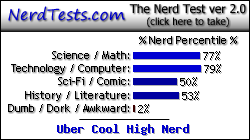This semester, I attack my senior project in Computer Science. We have been given the opportunity to contribute to Open Source as our senior project; of course, our experience will be well documented.
My team of four has taken on an altogether greater opportunity to work with IBM to encourage compatibility for Moodle with IBM's DB2 relational database management system (RDBMS). Moodle is an online course management system, written in PHP. Presently, Moodle's code supports Oracle, MS SQL, MySQL, and PostgreSQL. Their framework is flexible enough to allow an extension to support DB2, so that is our endeavor.
We have found, so far, that it is not a trivial task to work together on such a project; we are presently one month into the project and are just finishing up our preliminary research, defining the scope of our contributions, and establishing our development and testing environments.
And so it begins - I transition from just using Open Source to contributing to it!
Registered Linux User #370740 (http://counter.li.org)
WikiTrust - Accountability in the Open Encyclopedia
This article from MIT's Technology Review gives a succinct overview of the WikiTrust project, an effort at the University of California at Santa Cruz (UCSC) to add accountability to open knowledge bases, like Wikipedia, in order to make the content contained therein more useful. The project takes into consideration several aspects of each author's credentials and how their contributions are received by the editing community on that knowledge base; color coding is used for easy identification of the reliability indices that are provided.
This sort of construct, that requires human intervention to certify the authenticity or reliability of other humans on particular topics, is badly needed in most parts of the Internet - browsers are, at the present time, left mostly to their own devices to prove the validity of content they see online, conducting their own investigation of related material and researching the backgrounds of each "author" of online content.
This issue (of identifying experts) is, in fact, opposed to some aspects of the online privacy and anonymity movements for obvious reasons - the identity of the author must be guaranteed in order to certify that the information provided is valid; someone may simply impersonate a reputable expert in a field, posting erroneous information in their trusted name. This can only be avoided by using the web of trust identity system (thawte, wikipedia), which currently exists, but is not widely used. Web of trust works by providing a framework and workflow by which individuals may certify the identity of others, and through the web, someone may be trusted through any number of first-hand trusted connections. The framework, at its core, relies on digital cryptography. A wiki-like environment using the web of trust for certification should present some sort of a revision hash, uniquely identifying a particular revision, and experts trusted through the web of trust should then cryptographically sign that revision only, certifying that the contents of the article through that revision are accurate, and then be notified to likewise certify subsequent revisions. The more trusted signatures a document has, the more reliable it can be said to be, without further investigation.
These systems, however, require that users at large become familiar with their high-level architecture, and understand the implications of various actions taken with respect to them. This education phase is necessary to understand fully how to operate in the information age. Security and identity online can be compared to rudimentary physical security and human legal identity - it is highly uncommon that individuals broadcast their social security numbers or leave their vehicles or homes unlocked when leaving them. Likewise, it ought to be uncommon for Internet users to leave their sessions unattended or unsecured. This, however, requires that users understand the workings of this more complex system; a home or auto lock is quite simple to understand and use, still without knowing its inner workings, but the equivalent constructs in the computing world are a bit more difficult to understand and use.
Registered Linux User #370740 (http://counter.li.org)
This sort of construct, that requires human intervention to certify the authenticity or reliability of other humans on particular topics, is badly needed in most parts of the Internet - browsers are, at the present time, left mostly to their own devices to prove the validity of content they see online, conducting their own investigation of related material and researching the backgrounds of each "author" of online content.
This issue (of identifying experts) is, in fact, opposed to some aspects of the online privacy and anonymity movements for obvious reasons - the identity of the author must be guaranteed in order to certify that the information provided is valid; someone may simply impersonate a reputable expert in a field, posting erroneous information in their trusted name. This can only be avoided by using the web of trust identity system (thawte, wikipedia), which currently exists, but is not widely used. Web of trust works by providing a framework and workflow by which individuals may certify the identity of others, and through the web, someone may be trusted through any number of first-hand trusted connections. The framework, at its core, relies on digital cryptography. A wiki-like environment using the web of trust for certification should present some sort of a revision hash, uniquely identifying a particular revision, and experts trusted through the web of trust should then cryptographically sign that revision only, certifying that the contents of the article through that revision are accurate, and then be notified to likewise certify subsequent revisions. The more trusted signatures a document has, the more reliable it can be said to be, without further investigation.
These systems, however, require that users at large become familiar with their high-level architecture, and understand the implications of various actions taken with respect to them. This education phase is necessary to understand fully how to operate in the information age. Security and identity online can be compared to rudimentary physical security and human legal identity - it is highly uncommon that individuals broadcast their social security numbers or leave their vehicles or homes unlocked when leaving them. Likewise, it ought to be uncommon for Internet users to leave their sessions unattended or unsecured. This, however, requires that users understand the workings of this more complex system; a home or auto lock is quite simple to understand and use, still without knowing its inner workings, but the equivalent constructs in the computing world are a bit more difficult to understand and use.
Registered Linux User #370740 (http://counter.li.org)
Subscribe to:
Posts (Atom)



